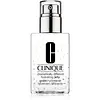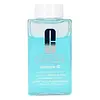Clinique Dramatically Different Hydrating Jelly Versus Clinique iD™ Dramatically Different™ Hydrating Clearing Jelly
What's inside
What's inside
 Key Ingredients
Key Ingredients

 Benefits
Benefits

 Concerns
Concerns

 Ingredients Side-by-side
Ingredients Side-by-side

Water
Skin ConditioningBis-PEG-18 Methyl Ether Dimethyl Silane
EmollientButylene Glycol
HumectantGlycerin
HumectantCucumis Sativus Fruit Extract
EmollientHypnea Musciformis Extract
Skin ProtectingGelidiella Acerosa Extract
Skin ProtectingHordeum Vulgare Extract
EmollientPadina Pavonica Thallus Extract
Skin ConditioningHelianthus Annuus Seedcake
AbrasiveSucrose
HumectantCaffeine
Skin ConditioningSodium Hyaluronate
HumectantHydroxyethyl Urea
HumectantHydrolyzed Rice Extract
Skin ConditioningSorbitol
HumectantSodium Polyaspartate
HumectantPPG-6-Decyltetradeceth-30
EmulsifyingEthylhexylglycerin
Skin ConditioningPropylene Glycol Dicaprate
EmollientCaprylyl Glycol
EmollientTrehalose
HumectantPolysorbate 80
EmulsifyingCarbomer
Emulsion StabilisingSodium Hydroxide
BufferingHexylene Glycol
EmulsifyingCitric Acid
BufferingSodium Citrate
BufferingDisodium EDTA
Phenoxyethanol
PreservativeWater, Bis-PEG-18 Methyl Ether Dimethyl Silane, Butylene Glycol, Glycerin, Cucumis Sativus Fruit Extract, Hypnea Musciformis Extract, Gelidiella Acerosa Extract, Hordeum Vulgare Extract, Padina Pavonica Thallus Extract, Helianthus Annuus Seedcake, Sucrose, Caffeine, Sodium Hyaluronate, Hydroxyethyl Urea, Hydrolyzed Rice Extract, Sorbitol, Sodium Polyaspartate, PPG-6-Decyltetradeceth-30, Ethylhexylglycerin, Propylene Glycol Dicaprate, Caprylyl Glycol, Trehalose, Polysorbate 80, Carbomer, Sodium Hydroxide, Hexylene Glycol, Citric Acid, Sodium Citrate, Disodium EDTA, Phenoxyethanol
Water
Skin ConditioningPropanediol
SolventGlycerin
HumectantButylene Glycol
HumectantBis-PEG-18 Methyl Ether Dimethyl Silane
EmollientSodium Hyaluronate
HumectantLaminaria Saccharina Extract
Skin ProtectingPyrus Malus Fruit Extract
Skin ConditioningCaffeine
Skin ConditioningLactic Acid
BufferingZinc PCA
HumectantAcetyl Glucosamine
Skin ConditioningTrehalose
HumectantHydroxyacetophenone
AntioxidantSalicylic Acid
MaskingUrsolic Acid
MaskingLactobacillus Ferment
Skin ConditioningPolysorbate 80
EmulsifyingCarbomer
Emulsion StabilisingXanthan Gum
EmulsifyingSodium Hydroxide
BufferingDisodium EDTA
Sodium Citrate
BufferingPhenoxyethanol
PreservativeCI 42090
Cosmetic ColorantWater, Propanediol, Glycerin, Butylene Glycol, Bis-PEG-18 Methyl Ether Dimethyl Silane, Sodium Hyaluronate, Laminaria Saccharina Extract, Pyrus Malus Fruit Extract, Caffeine, Lactic Acid, Zinc PCA, Acetyl Glucosamine, Trehalose, Hydroxyacetophenone, Salicylic Acid, Ursolic Acid, Lactobacillus Ferment, Polysorbate 80, Carbomer, Xanthan Gum, Sodium Hydroxide, Disodium EDTA, Sodium Citrate, Phenoxyethanol, CI 42090
 Reviews
Reviews

Ingredients Explained
These ingredients are found in both products.
Ingredients higher up in an ingredient list are typically present in a larger amount.
Bis-Peg-18 Methyl Ether Dimethyl Silane belongs to the siloxanes and silicones classes. It is synthetically created and has a waxy composition.
This ingredient is a humectant and emollient, meaning it helps hydrate the skin. Humectants draw moisture to your skin, while emollients prevent moisture from escaping.
Butylene Glycol (or BG) is used within cosmetic products for a few different reasons:
Overall, Butylene Glycol is a safe and well-rounded ingredient that works well with other ingredients.
Though this ingredient works well with most skin types, some people with sensitive skin may experience a reaction such as allergic rashes, closed comedones, or itchiness.
Learn more about Butylene GlycolCaffeine is most associated with coffee, tea, and cacao. In skincare, it helps with calming inflammation and is rich in antioxidants.
While caffeine is used to treat cellulite and and dark circles, further studies are needed to prove this. It has been believed to help with these skin conditions due to its ability to dilate blood vessels and increase blood flow.
Some studies are looking into caffeine's ability to protect against UV rays.
Learn more about CaffeineCarbomer is a polymer of acrylic acid. Its main role is to create a gel consistency.
A high amount of carbomer can cause pilling or balling up of products. Don't worry, most products contain 1% or less of carbomer.
Disodium EDTA plays a role in making products more stable by aiding other preservatives.
It is a chelating agent, meaning it neutralizes metal ions that may be found in a product.
Disodium EDTA is a salt of edetic acid and is found to be safe in cosmetic ingredients.
Learn more about Disodium EDTAGlycerin is already naturally found in your skin. It helps moisturize and protect your skin.
A study from 2016 found glycerin to be more effective as a humectant than AHAs and hyaluronic acid.
As a humectant, it helps the skin stay hydrated by pulling moisture to your skin. The low molecular weight of glycerin allows it to pull moisture into the deeper layers of your skin.
Hydrated skin improves your skin barrier; Your skin barrier helps protect against irritants and bacteria.
Glycerin has also been found to have antimicrobial and antiviral properties. Due to these properties, glycerin is often used in wound and burn treatments.
In cosmetics, glycerin is usually derived from plants such as soybean or palm. However, it can also be sourced from animals, such as tallow or animal fat.
This ingredient is organic, colorless, odorless, and non-toxic.
Glycerin is the name for this ingredient in American English. British English uses Glycerol/Glycerine.
Learn more about GlycerinPhenoxyethanol is a preservative that has germicide, antimicrobial, and aromatic properties. Studies show that phenoxyethanol can prevent microbial growth. By itself, it has a scent that is similar to that of a rose.
It's often used in formulations along with Caprylyl Glycol to preserve the shelf life of products.
Polysorbate 80 is a surfactant and emulsifier. It is used to keep ingredients together, and prevent oils and waters from separating.
It is made from polyethoxylated sorbitan and oleic acid. This ingredient can be found in cosmetics, foods, and medicine. It is water-soluble.
Polysorbate 80 may not be fungal acne safe.
Learn more about Polysorbate 80Sodium Citrate is the sodium salts of citric acid. In skincare, it is used to alter pH levels and acts as a preservative.
Its main functions are to maintain the pH of a product and neutralize metal ions.
The acidity of our skin is maintained by our glands and skin biome; normal pH level of skin is slightly acidic (~4.75-5.5).
Being slightly acidic allows our skin to create an "acid mantle". This acid mantle is a thin barrier that protects our skin from bacteria and contaminants.
Learn more about Sodium CitrateSodium Hyaluronate is hyaluronic acid's salt form. It is commonly derived from the sodium salt of hyaluronic acid.
Like hyaluronic acid, it is great at holding water and acts as a humectant. This makes it a great skin hydrating ingredient.
Sodium Hyaluronate is naturally occurring in our bodies and is mostly found in eye fluid and joints.
These are some other common types of Hyaluronic Acid:
Learn more about Sodium HyaluronateSodium Hydroxide is also known as lye or caustic soda. It is used to adjust the pH of products; many ingredients require a specific pH to be effective.
In small amounts, sodium hydroxide is considered safe to use. However, large amounts may cause chemical burns due to its high alkaline.
Your skin has a natural pH and acid mantle. This acid mantle helps prevent harmful bacteria from breaking through. The acid mantle also helps keep your skin hydrated.
"Alkaline" refers to a high pH level. A low pH level would be considered acidic.
Learn more about Sodium HydroxideTrehalose is a disaccharide made of two glucose molecules (glucose is sugar!). Trehalose is used to help moisturize skin. It also has antioxidant properties.
As a humectant, trehalose helps draw moisture from the air to your skin. This helps keep your skin hydrated.
Due to its antioxidant properties, trehalose may help with signs of aging. Antioxidants help fight free-radical molecules, unstable molecules that may damage your skin.
In medicine, trehalose and hyaluronic acid are used to help treat dry eyes.
Some animals, plants, and bacteria create trehalose as a source of energy to survive freeze or lack of water.
Learn more about TrehaloseWater. It's the most common cosmetic ingredient of all. You'll usually see it at the top of ingredient lists, meaning that it makes up the largest part of the product.
So why is it so popular? Water most often acts as a solvent - this means that it helps dissolve other ingredients into the formulation.
You'll also recognize water as that liquid we all need to stay alive. If you see this, drink a glass of water. Stay hydrated!
Learn more about Water